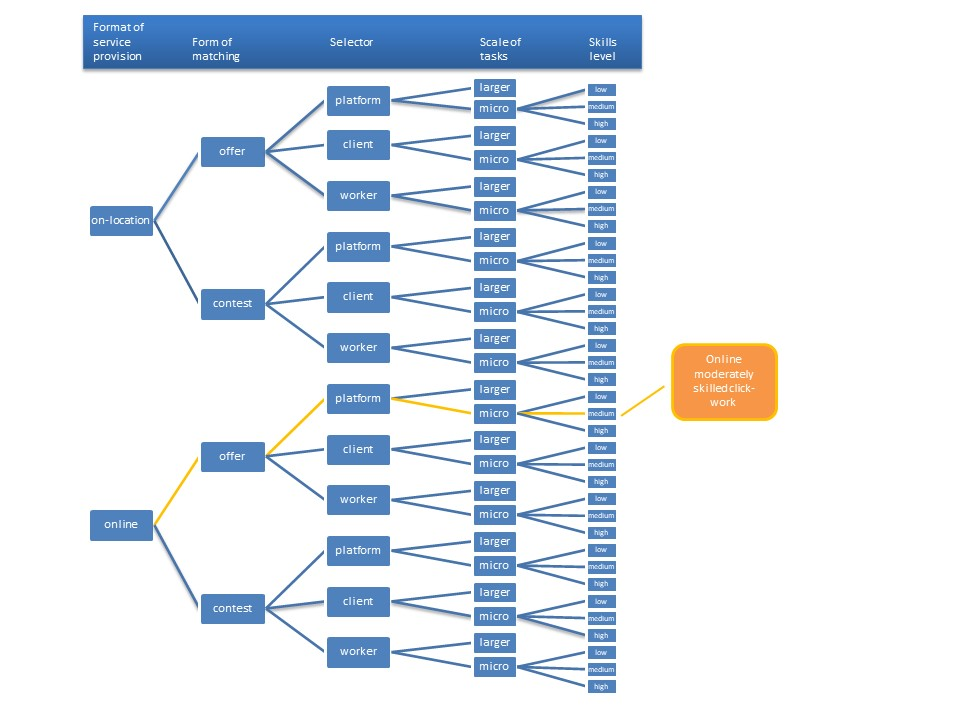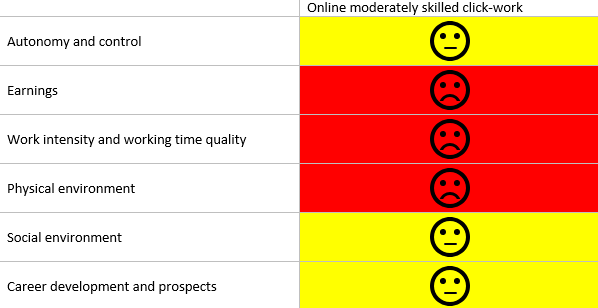Platform work is a form of employment that uses an online platform to enable organisations or individuals to access other organisations or individuals to solve problems or to provide services in exchange for payment. Eurofound identified 10 different types of platform work prevalent in Europe as of 2017. Three of the 10 types were covered in an in-depth study of working and employment conditions. These, together with two additional ones, are also discussed in a policy brief highlighting the key issues arising in platform work as well as first solutions to tackle them.
- Publication: Employment and working conditions for selected types of platform work
- Publication and working papers: Platform work: Maximising the potential while safeguarding standards?
Online moderately skilled click-work covers work that is delivered online via a platform and is of very low scale (that is, tasks can often be completed within seconds or minutes). This type of platform work is often used by companies to outsource automation tasks that require a human interaction, such as classifying a picture or categorising a product. Research institutes make use of this kind of platform work to acquire participants for surveys.
- Platform economy database: Online moderately skilled click-work
Characteristics
Overview of the characteristics that constitute online moderately skilled click-work

Source: Eurofound 2018
Format of service provision
Format of service provision refers to whether the work is performed online or offline (on-location). As the label suggests, online moderately skilled click-work is delivered online, usually via the website of the platform or via a customised app on a mobile device.
Form of matching
The process of allowing clients and workers to find each other is the main issue for platforms. Platforms are highly invested in optimising the matching process, as the more smoothly clients are matched to workers, the more reason they will have to stay exclusively on one platform, instead of using a different platform or exiting the market. In online moderately skilled click-work, the matching is done by means of an offer. The platform, usually in the form of an algorithm, offers tasks that are being requested to platform workers, who can decide to accept or decline them. On some platforms, rejecting a task can mean that similar tasks are not offered over a period of time and this could therefore have a negative impact on the platform worker.
- Platform economy database: Algorithmic matching of clients and workers
Selector
Selection can be made by the client, worker, or the platform. In online moderately skilled click-work, the platform (algorithmically) allocates a given task to a given worker. Clients have the possibility to specify certain criteria, such as language capabilities, that will be taken into account in the selection process.
Scale of tasks
Platform work can involve tasks on a wide-ranging scale of duration and complexity. There may be large, long-term projects, as well as micro-tasks. Online moderately skilled click-work is mostly associated with micro-tasks, as completion usually takes only a few minutes, often even just seconds, for example in cases where the worker is requested to determine in a simple classification whether a photo falls into a certain category or not.
Skills level
A given task may require low, medium, or high skills. This refers to the traded tasks and not necessarily to the skills that the workers possess, since it is not uncommon that highly educated individuals carry out simple tasks through platforms. In online moderately skilled click-work, the required skills level is usually low to moderate. Some tasks require no specific skills at all (such as accessing a video to artificially increase the number of views for marketing purposes), while others require skills such as speaking a specific language or working with spreadsheets. This moderate skill level makes the barrier of entry low, which is why this kind of platform work is often used to earn extra money in addition to earnings from a main job.
Selected working conditions in online moderately skilled click-work

In the context of platform work, autonomy involves the freedom of workers to choose which tasks they do, when they work, and how to organise and perform their work. In online moderately skilled click-work, autonomy strongly depends on the workers’ motivation to engage in and their dependency on platform work. Strong algorithmic control and importance of rating mechanisms have a negative impact on autonomy.
Competition on micro-task platforms pushes down earnings. The low skills level required carries some risk of a race to the bottom as regards prices. On the positive side, however, there is a low likelihood of non-payment by clients.
The intensity and working time quality is negatively impacted by the perceived need to be continuously available to take advantage of good task offers, resulting in being mentally occupied with tasks and missed opportunities when not working. Working time duration and schedule strongly depends on the worker’s motivation to engage in and dependency on platform work. There is also working time spent in searching for tasks, which is not paid. The work can be stressful, as working at high speed and meeting tight deadlines is involved.
The physical environment is characterised by the risk of physical health impacts such as visual fatigue or musculoskeletal problems. Only minimal information and support is provided by the platform regarding health and safety standards.
As regards the social environment, the relationship between worker and platform is limited. This can be problematic if difficulties emerge. There is also the potential for discrimination through algorithms and ratings and the lack of mechanisms to address this.
The career development and prospects are usually very limited. Although a good performance in the past can lead to receiving better paying tasks, there are no career prospects, while the skills used in this kind of platform work are often not related to the workers’ main occupation or educational degree.
- Platform economy repository: Autonomy and control
- Platform economy repository: Work intensity and working time quality
- Platform economy repository: Social environment
- Initiatives: Negotiating working conditions